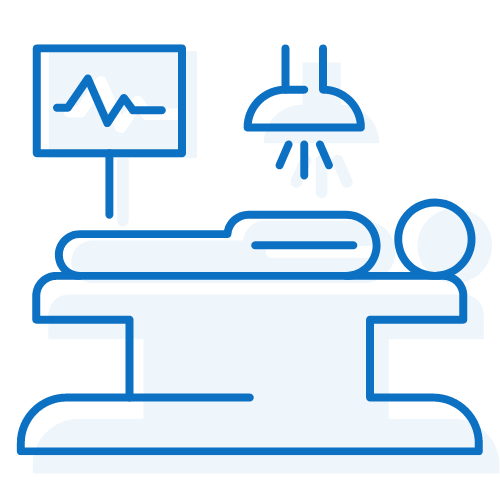Appendicitis – Causes, Symptoms, Treatment and Prevention
Appendicitis is a condition in which the appendix becomes inflamed and filled with pus. The appendix is a small, tube-like structure that is attached to the large intestine.
Overview of Appendicitis
Appendicitis is the inflammation of the appendix. It is considered a medical emergency. It needs surgery that involves the removal of the appendix. The appendix normally sits in the lower right abdomen. The appendix is located at the junction of the large and the small intestine. Appendicitis starts with pain and within hours, the pain travels to the lower right-hand side. Although anyone can develop appendicitis at any age, it generally occurs in people between the age group of 10 to 30.
The appendix is a small, squishy organ which is tube-shaped. The job is to receive undigested food from the small intestine. It also helps absorb fluids and salts that remain after food is digested, and mix them with mucus for easier elimination. The proximity and tissue connections between the cecum and appendix recommend that the latter plays a part in the digestive process.
Free Consultation
Get Appendicitis treatment cost estimate
Causes & Symptoms of Appendicitis
Causes of Appendicitis are discussed below:
- Blockage inside the appendix
- Enlarged tissue in appendix
- Inflammatory bowel disease
- Stool, parasites, or growths which clog the appendiceal lumen
- Trauma to your abdomen
Signs or Symptoms of Appendicitis are:
- Sudden pain on the right side of the abdomen
- Sudden pain around the navel which shifts to the lower right abdomen
- Pain that worsens while coughing, walking or making jarring movements
- Nausea and vomiting
- Loss of appetite
Types of Appendicitis
Acute Appendicitis:
It occurs all of a sudden. A patient may experience an intense course of symptoms that require surgical treatment.
Chronic Appendicitis:
If a patient suffers from chronic appendicitis, he or she may experience a long-standing inflammation of the appendix.
Recurring Appendicitis:
This is another type of appendicitis. If the affected appendix is not removed, there are chances that it may get infected and inflamed over and over again.
Treatments of Appendicitis

Diagnosis
The doctors at Mantra Care will review the medical history, digestive illnesses and may ask about the digestive symptoms. They may include timings of the most recent bowel movements, character, and whether the stool was streaked with blood or mucus. After that, the doctor will assess the pain in the lower right abdomen of the patient. Post-physical examination, the doctor may ask for blood tests to check for signs of infection. A urinalysis will be needed to rule out a urinary tract problem. The appendicitis doctor may order an ultrasound or computed tomography (CT) scan to help confirm the diagnosis.

Surgery
The doctor will perform a surgical operation to take out the infected appendix. It is called an appendectomy. This surgery is highly recommended at the earliest, as the appendix can burst within 48 to 72 hours after early symptoms. This can lead to the spread of bacteria inside the body and can be fatal. There are two surgical methods for the treatment of appendix and Mantra Care doctors recommend laparoscopic surgery. Laparoscopic Surgery: Surgeons use a small device, a laparoscope, to remove the appendix. They form a small cut on the belly with a laparoscope that has a tiny video camera and surgical tools. The tube, camera, and tools are put in through the incisions. The surgeon performs the surgery while looking at a TV monitor and removes the appendix. It is a minimally invasive treatment so the patient can get back to normal routine in 2-3 days and there won’t be any major scar and wounds.

Home Remedies
Diet: After the surgery, various people recover within 2 to 6 weeks and have no major, long-term health problems. Most people do not need to change their diet, exercise, or lifestyle.

Homeopathic Treatment
The homeopathic treatment of appendicitis entails the usage of certain homeopathic remedies.
- Arnica: This remedy is used in septic cases, and after a surgical operation for treating bruises.
- Arsenic: In the septic condition, when the affected individual experiences weakness and loss of appetite, Arsenic is used. Chills, diarrhea, nervous symptoms, and restlessness are also symptoms that can be treated with it. The patient may feel relief by vomiting in such circumstances.
- Belladonna: It is used in the initial stages of appendicitis when the affected individual happens to experience severe pain.

Ayurveda
If a patient has acute appendicitis, it can be treated with the use of Antarvidradi and Dhatu Pakahara Ousadhas, Ama Pachana Pousadas. In chronic conditions, it is better to refer to a hospital.

Allopathic Treatment
A doctor can manage mild to moderately severe appendicitis with antibiotics, if there are no major perforation of the appendix or complications. Patients get relief from inflammation with antibiotics but it is unclear how many patients respond to antibiotics. The antibiotic treatment entails intravenous antibiotics for two days. If the patient does not respond within 24 hours to the antibiotics, he may need surgery immediately.

Prevention
There are no ways to prevent appendicitis. However, it is less common in people who eat foods high in fiber. These include fresh vegetables and fruits. If you feel the symptoms, call your doctor immediately or make an appointment with Mantra Care for the best quality check-up and proper treatment.
Our clinics are accessible from these cities

3000+
Happy Patients

1000+
Surgeries

10+
Doctors

Clinics Across India

Multi-
City

3+
Hospitals
Our Clinical Footprint
We provide easy storage and access to information from Mantra Care technology. Here, patients can easily acquire notes from virtual doctor consultation, treatment plans, prescriptions, and more from one place. Get medical information 24/7 from any digital device.
Mantra Care aims at creating a much more efficient experience for the patients through their cost-effective and quality-driven medical treatments.
We provide relatively lower cost treatments for almost every health problem making our company the best choice for patients. Mantra Care technology automates all the manual tasks for members and doctors, making it a viable choice for acquiring lower-cost treatments.